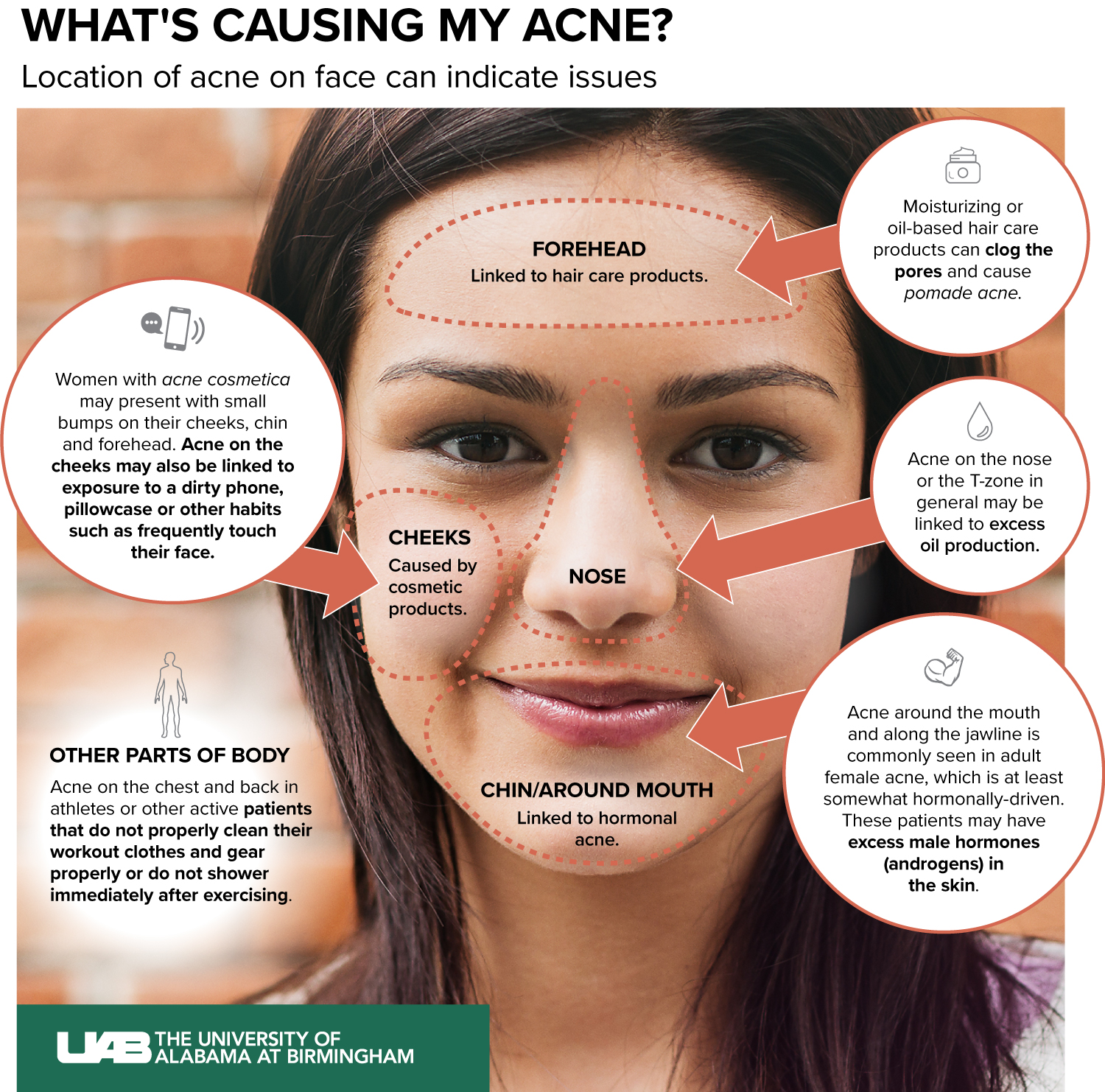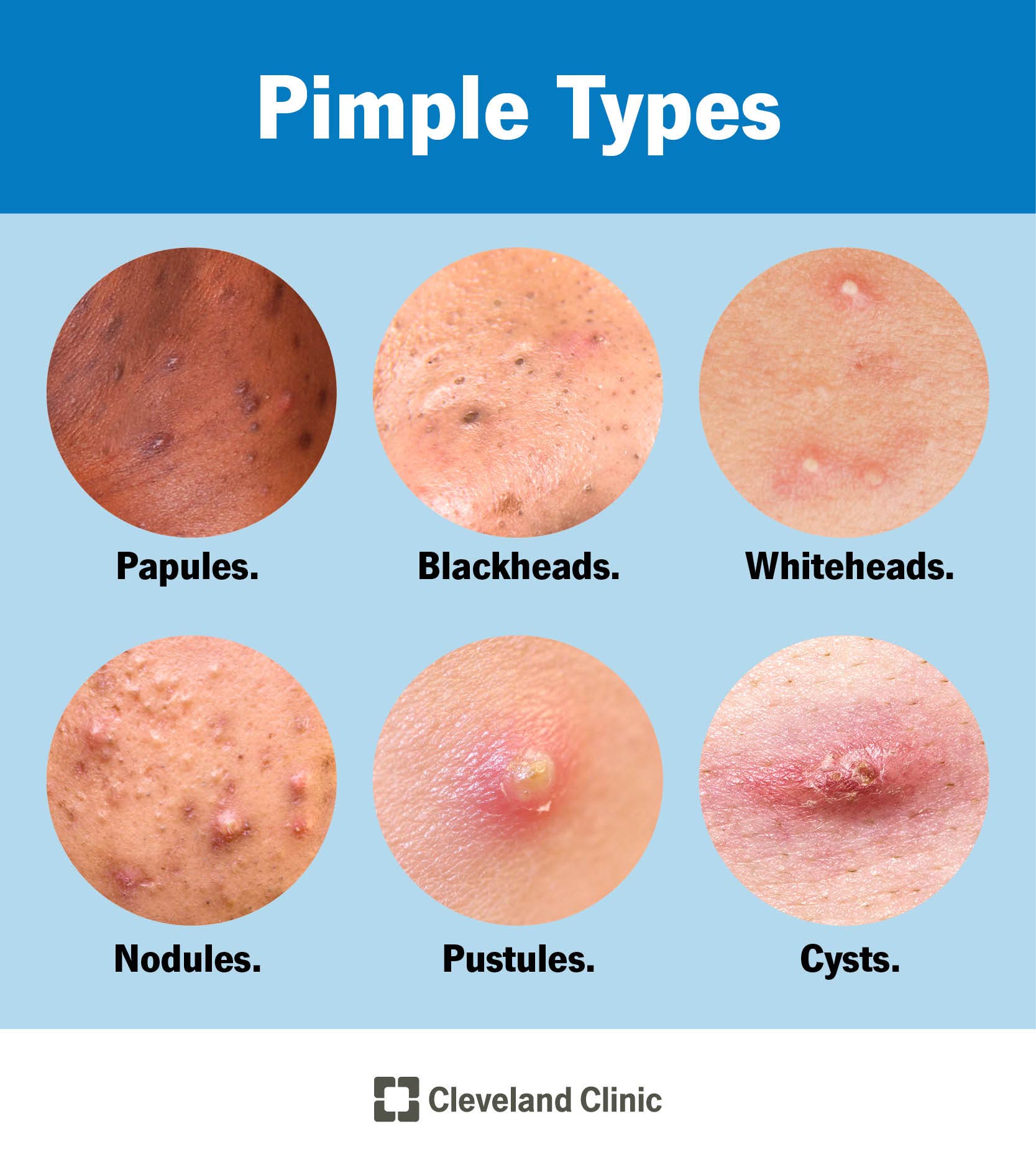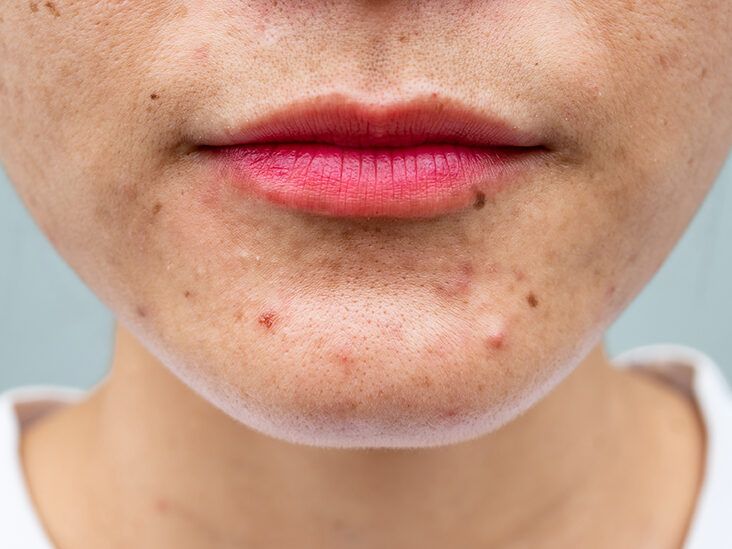Pimples on the face are caused by clogged or inflamed sebaceous glands, which can result from increased sebum production or abnormal formation of keratin. Proper skin care, avoiding irritants, and protecting the skin from the sun can help prevent pimples.
Additionally, cleansing problem areas with a gentle cleanser and using over-the-counter acne products with ingredients like benzoyl peroxide and salicylic acid can help treat and reduce the appearance of pimples. Pimples occur when the pores of the skin become blocked with oil, dead skin, or bacteria.
Understanding the causes and taking preventive measures can help maintain clear and healthy skin.
Causes Of Pimples On The Face
Pimples on the face are caused by clogs and inflammation in the sebaceous glands, which can be a result of increased sebum production or abnormal formation of keratin. To prevent pimples, it's important to keep your skin clean, choose the right skincare products, and avoid touching your face.
| Causes of Pimples on the Face |
| Clogs and inflammation in your sebaceous glands cause pimples to form. These clogs and inflammation can be a result of various factors, including increased sebum production and abnormal formation of keratin. Sebum is an oily material produced by the sebaceous glands, and when there is an excess production of sebum, it can contribute to pore clogging. Keratin is a protein that helps in maintaining the health of hair, skin, and nails. However, abnormal formation of keratin can lead to pore blockage and the development of pimples. It is important to keep your skin clean, choose the right skincare products, and avoid touching or picking at acne-prone areas to prevent the occurrence of pimples on your face. Additionally, using ingredients like benzoyl peroxide, retinoids, and salicylic acid can help reduce inflammation and unclog pores, thus making pimples go away. |

Credit: www.uab.edu
How To Prevent Pimples On The Face
What causes pimples on the face? Pimples form due to clogs or inflammation in the sebaceous glands. This can be caused by increased sebum production or abnormal formation of keratin. To prevent pimples on the face, it is important to keep your skin clean. Use a gentle cleanser and wash problem areas regularly.
Choosing the right skin care products is also crucial. Look for products that are suitable for your skin type and are non-comedogenic. Additionally, shampooing regularly can help keep your scalp and hair clean, reducing the chances of oils and bacteria transferring to the face. Stick to your acne treatment routine and avoid touching your face with dirty hands. Stay out of the sun and tanning beds, as excessive sun exposure can worsen acne. Follow these tips to maintain clear and healthy skin.
Treatment For Facial Pimples
When it comes to treating facial pimples, it is important to follow a proper skincare routine. Start by washing problem areas with a gentle cleanser. This helps remove excess oil and bacteria from the skin. Moreover, you can try using over-the-counter acne products that contain ingredients like benzoyl peroxide or salicylic acid.
These products help dry excess oil and promote the peeling of dead skin cells. Additionally, it is important to avoid irritants that can further inflame the skin. This includes harsh soaps, fragrances, and certain cosmetic products. To protect your skin from further breakouts, make sure to avoid touching or picking at acne-prone areas and shower after strenuous activities.
Remember to also protect your skin from the sun as sun exposure can worsen acne. Overall, following a consistent skincare routine and avoiding irritants can help in the treatment of facial pimples.

Credit: my.clevelandclinic.org
Factors That Make Pimples Go Away
Several factors can contribute to the formation of pimples on the face. One common treatment option is the use of Benzoyl Peroxide, which helps decrease the presence of P. acnes bacteria on the skin. Additionally, Retinoid-based treatments can be effective in unclogging pores and reducing oiliness.
Another option is the use of Salicylic Acid, which eases inflammation and unclogs pores. It's important to keep the skin clean and choose the right skincare products to prevent future breakouts. Regularly washing problem areas with a gentle cleanser and using over-the-counter acne products can help dry excess oil and promote peeling. It's also essential to avoid irritants, protect the skin from the sun, and avoid touching or picking acne-prone areas.
By following these measures and using appropriate treatments, you can help make pimples go away and improve the condition of your skin.
Understanding Acne And Pimples
Pimples on the face can be caused by clogs or inflammation in your sebaceous glands, which are responsible for producing oily material. Factors such as increased sebum production and abnormal formation of keratin can lead to these clogs and inflammation.
To prevent pimples, it is important to keep your skin clean, choose the right skincare products, and avoid touching your face.
Understanding Acne and Pimples Acne and pimples are common skin conditions that can cause distress and discomfort. They are usually caused by clogs or inflammation in the sebaceous glands, which are responsible for producing sebum, an oily substance that helps maintain the moisture of the skin. These clogs and inflammation can occur due to increased sebum production or abnormal formation of keratin, a protein that contributes to hair, skin, and nail health.
To prevent the occurrence of pimples on the face, it is important to keep the skin clean and opt for the right skincare products. Regularly shampooing your hair can also help prevent the transfer of oil and dirt to the face. Additionally, it is crucial to stick to a consistent treatment plan and avoid touching the face. Protecting the skin from the sun and avoiding tanning beds are also recommended. When it comes to treating facial pimples, several lifestyle and home remedies can be beneficial. Washing problem areas with a gentle cleanser, using over-the-counter acne products, and avoiding irritants can help manage acne.
Protecting the skin from friction or pressure, refraining from touching or picking acne-prone areas, and showering after strenuous activities are also part of an effective skincare routine. Furthermore, benzoyl peroxide, retinoids, and salicylic acid are some commonly used ingredients that can aid in reducing pimples. In conclusion, understanding the causes, symptoms, and management of acne and pimples is vital for maintaining healthy skin. By following a proper skincare regimen and implementing appropriate treatment methods, you can help control and reduce the occurrence of pimples on your face.
Common Causes Of Acne
Common Causes of Acne:
- Blocked Pores: Clogs or inflammation in your sebaceous glands cause pimples to form. Increased sebum production and abnormal formation of keratin can lead to blocked pores.
- Excess Oil Production: Overproduction of sebum, an oily material produced by the sebaceous glands, can contribute to the development of pimples on the face.
- Bacterial Infection: Pimples can also be caused by a bacterial infection, specifically the presence of pimple-causing bacteria on the skin.
To prevent pimples on the face, it is important to keep the skin clean, choose the right skin care products, shampoo regularly, and avoid touching or picking at acne-prone areas. Over-the-counter acne products, such as those containing benzoyl peroxide or salicylic acid, can help reduce excess oil and inflammation, while retinoids can unclog pores. It is also essential to protect the skin from the sun and avoid friction or pressure on the skin.
Acne Face Map: Understanding Breakout Locations
Acne, commonly known as pimples, can be caused by various factors. One of the main causes is the overproduction of sebum, the oily material produced by the sebaceous glands. This excess sebum can clog the pores and lead to the formation of pimples.
Another factor that can contribute to the development of pimples is the abnormal formation of keratin, the protein that helps make your hair, skin, and nails. When keratin builds up and mixes with sebum, it can block the pores and result in acne.
In addition to bacterial and oil production factors, hormonal changes can also play a significant role in the formation of pimples. Fluctuations in hormone levels, especially during puberty, can increase sebum production and make the skin more prone to breakouts.
External factors, such as sweating, friction, or exposure to certain chemicals, can further aggravate the skin and trigger acne. It is important to keep the skin clean, choose the right skincare products, and protect it from excessive exposure to the sun.
To treat and prevent pimples, it is recommended to wash problem areas with a gentle cleanser, use over-the-counter acne products, avoid irritants, protect the skin from the sun, and refrain from touching or picking at acne-prone areas.

Credit: www.healthline.com
Frequently Asked Questions For What Causes Pimple On The Face
What Is The Main Cause Of Pimples On Face
Clogged or inflamed sebaceous glands cause pimples on the face due to increased sebum production and abnormal keratin formation.
How Can I Stop Getting Pimples On My Face?
To stop getting pimples on your face, follow these steps: 1. Keep your skin clean 2. Choose the right skincare products 3. Shampoo regularly 4. Stick to your treatment 5. Avoid touching your face and stay out of the sun.
How Do You Treat Facial Pimples?
To treat facial pimples, follow these steps: 1. Wash problem areas with a gentle cleanser. 2. Use over-the-counter acne products to dry excess oil and promote peeling. 3. Avoid irritants and protect your skin from the sun. 4. Avoid touching or picking acne-prone areas and shower after strenuous activities.
5. Benzoyl peroxide, retinoids, and salicylic acid can help reduce inflammation and unclog pores.
Conclusion
To prevent and treat pimples on the face, it is important to keep the skin clean and choose the right skincare products. Regularly shampooing and avoiding irritants can also help. Over-the-counter acne products, such as those containing benzoyl peroxide or salicylic acid, can aid in drying excess oil and reducing inflammation.
Additionally, practicing good hygiene, such as not touching or picking at acne-prone areas, and protecting the skin from the sun can make a difference. By following these tips, you can effectively manage and prevent pimples on the face.







0 Comments